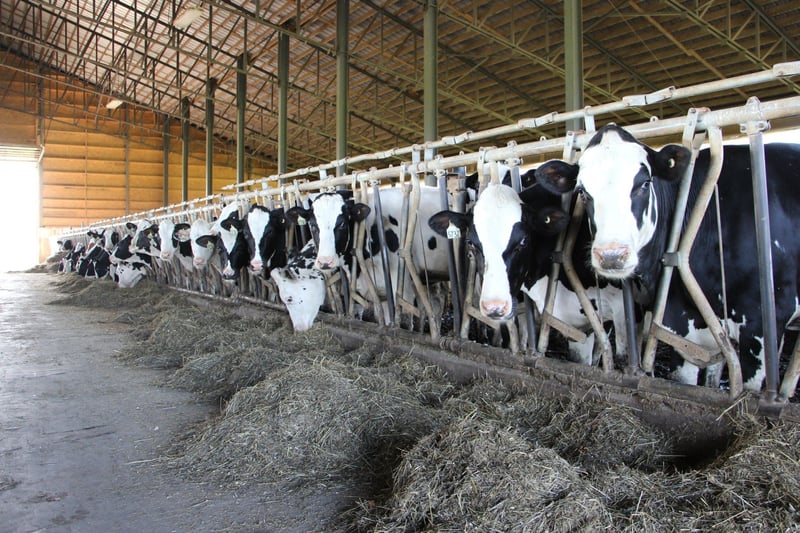
Dairy cows housed in tie stall barns are tethered continuously or for part of the day. What exactly are tie stalls and why are they a low welfare form of housing for dairy cows?
Tie stalls are a form of housing in the dairy industry where cows are tethered at the neck to their stall. This cruel confinement method restricts their movement, ability to socialize, graze, groom, and perform other natural behaviors.
Tie stalls for dairy cows are still used in the US. Currently, approximately 39% of dairy farms in the US use tie stall housing.
On some farms, tied cattle are permitted seasonal access to pasture, but otherwise, their movements are restricted compared to cows housed in free stall barns or other loose housing systems. Free stall housing without access to the outdoors also has its welfare challenges. However, when cows are given outdoor access daily (untethered and able to move around in a paddock or pasture), their welfare improves substantially.
One important measure of welfare is whether animals display aberrant behavior called stereotypies. ‘Stereotypical behavior’ is pointless, repetitive behaviors animals perform when they experience stress or frustration with their living conditions. Cows kept in tie stalls have been shown to perform abnormal behaviors such as tongue rolling (which is associated with an inability to graze), rubbing against equipment, and bar biting. These lessen when animals are given daily access to the outdoors. Cows in tie stalls without daily exercise opportunities also spend more time licking and sniffing the ground or other objects and less time ruminating (an important cow behavior). In one study, when released, tied cattle without regular outdoor access spent more time engaged in play behavior and trotting, suggesting a positive feeling state when released from confinement.
Housing attributes are vital to dairy cow welfare and comfort. Systems that permit cows to walk around and socialize, access the outdoors, and lie down comfortably are crucial. Deeply bedded stalls that allow cows to lie down (some stalls are too small for cows, causing chronic health problems) help prevent lameness and mastitis--common health conditions affecting dairy cows.
Unfortunately, there are currently no states in the US that fully ban the use of tie stalls, despite multiple states passing laws to address other farmed animal confinement like gestation crates, veal crates, and battery cages.
If you want to take action now for cows and other farm animals, urge your legislators to support the Farm System Reform Act, which will decrease the number of farmed animals kept in confinement like tie stalls. You can help stop the suffering that farm animals endure because of cruel intensive farming practices here in the US and worldwide.
